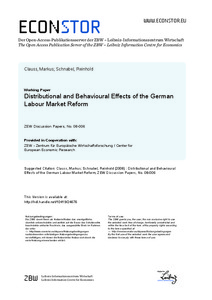Distributional and behavioural effects of the German labour market reform
"We estimate the effects of the reform of the German Unemployment Insurance that replaced the wage related Unemployment Assistance with an income maintenance program and stronger means testing. We model the tax-benefit system and use the Socio-Economic Panel. We estimate a discrete labour suppl...
| Main Authors: | , |
|---|---|
| Institution: | ETUI-European Trade Union Institute |
| Format: | TEXT |
| Language: | English |
| Published: |
Mannheim
2008
ZEW |
| Subjects: | |
| Online Access: | https://www.labourline.org/KENTIKA-19189642124919078249-Distributional-and-behavioural.htm |
| Summary: | "We estimate the effects of the reform of the German Unemployment Insurance that replaced the wage related Unemployment Assistance with an income maintenance program and stronger means testing. We model the tax-benefit system and use the Socio-Economic Panel. We estimate a discrete labour supply model and simulate the behavioural and distributional effects using the pseudo-distribution method. Poverty and inequality decline overall, since households with children and low income gain, while those who used to earn high wages and received high unemployment transfers lose most. The behavioural responses mitigate the redistributive impact of the reform." |
|---|---|
| Physical Description: | 24 p. Digital |

